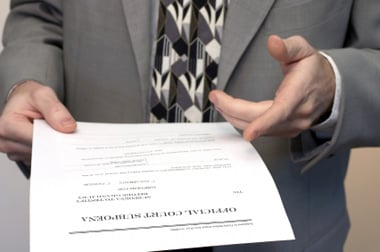Process Serving Across State Lines Explained
Serving legal documents in another state can be tricky. This blog covers what you need to know, from key rules and laws to tips for avoiding mistakes. Whether you're an attorney, paralegal, or handling a case across state lines, this guide makes the process clear and simple.
12/18/2024
If you’ve ever wondered how legal documents travel from one state to another, you’re not alone. The process of serving legal documents across state lines can be tricky, but it’s also fascinating. Whether you’re involved in a legal case or just curious about the behind-the-scenes work of legal servers, this guide will walk you through everything you need to know.
1. Why Serving Legal Documents Across States Is Complicated
You might think serving legal documents in another state is as easy as mailing a birthday card. Spoiler alert: it’s not. Each state has its own rules and regulations about how documents like subpoenas or summons are served. This means a legal server has to understand not just one state’s laws, but potentially two or more.
For example, while one state might allow service by certified mail, another might require personal delivery. Crossing state lines adds layers of complexity that make the job of legal servers both challenging and rewarding. But don’t worry, they’ve got the skills to navigate these murky waters.
2. The Role of Legal Servers in Interstate Cases
When legal cases involve parties in different states, legal servers step in as the ultimate couriers of justice. Their job isn’t just about delivering papers; it’s about ensuring the legal process remains fair and consistent.
Let’s say you’re suing someone who lives three states away. You can’t just show up at their door with legal papers and a smile (though that would be interesting). Instead, you need a certified legal server who understands the local rules of that state.
These professionals work with a network of servers across the country, ensuring your documents are delivered legally and promptly. It’s like having a nationwide team of legal ninjas on your side—minus the stealth suits.
3. Navigating State and Federal Jurisdictions
Here’s where things get even more interesting: some cases involve federal laws, while others fall under state jurisdiction. Legal servers must understand which rules apply to your situation and follow them to the letter.
For instance, federal courts often have stricter guidelines for serving documents than state courts. A legal server working on a federal case may need to adhere to specific timeframes or delivery methods. These nuances are why hiring a professional is so important, you don’t want your case delayed because of a small mistake.
4. How Technology Is Changing the Game
You might be wondering: does technology make serving documents across state lines easier? The answer is yes—and no. While online tools and databases help legal servers locate hard-to-find recipients, the actual act of serving documents often still requires a personal touch.
Some states are beginning to allow e-service (electronic service), but this isn’t yet the norm. For now, legal servers often rely on tried-and-true methods like in-person delivery. Still, the use of technology means they can work faster and more efficiently, keeping the wheels of justice turning smoothly.
5. What Happens If Someone Refuses Service?
Believe it or not, not everyone is thrilled to receive legal papers. Some people try to dodge legal servers, thinking this will help them avoid a court case. Spoiler alert again: it doesn’t work.
Legal servers are trained to handle evasive recipients. They use tactics like tracking down alternative addresses or even waiting for someone to show up at a predictable location. (Yes, they’re that dedicated.) And if personal delivery isn’t possible, the courts may allow alternative methods like posting notices or serving through a third party.
6. Why You Need a Professional for Interstate Process Serving
If you’re dealing with a legal matter that crosses state lines, you might feel tempted to handle the service yourself. Trust us don’t. The rules are too complex, and one misstep could derail your case.
Hiring a professional legal server ensures your documents are delivered according to the law, no matter where the recipient is located. These experts understand the nuances of interstate process serving and have the resources to get the job done right.
Final Thoughts
Process serving across state lines might sound complicated, but it’s all in a day’s work for skilled legal servers. They bridge the gap between states, ensuring justice is served—literally.
Next time you hear about a multi-state legal case, take a moment to appreciate the hard work happening behind the scenes. It’s not just about delivering papers; it’s about making sure every party gets their fair shot in court. And that’s something we can all support.
Whether you’re involved in a legal matter or just want to understand the process, remember legal servers are the glue that holds our justice system together. From state to state, they ensure that no one is left out of the loop. And that’s worth celebrating!
If you’re looking for reliable, professional help, contact LFI Elite Process Service, LLC today. "Were We Make Process Easy". We’re here to ensure your legal documents are delivered the right way—on time, every time.




Reach out to us today!!!
Cell : (813)785-4361
Email : Service@lfieliteprocess.com


Office : (863)617-9257
